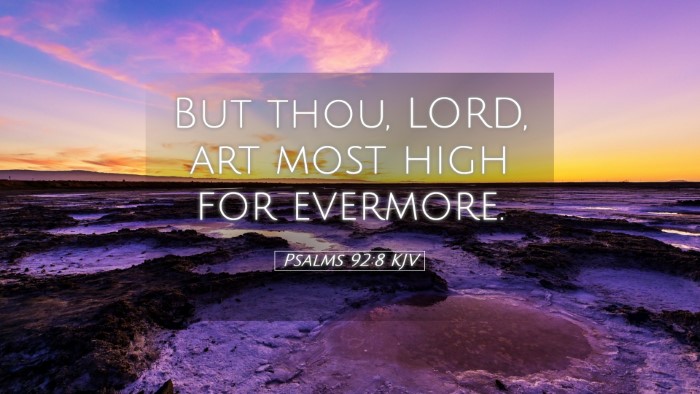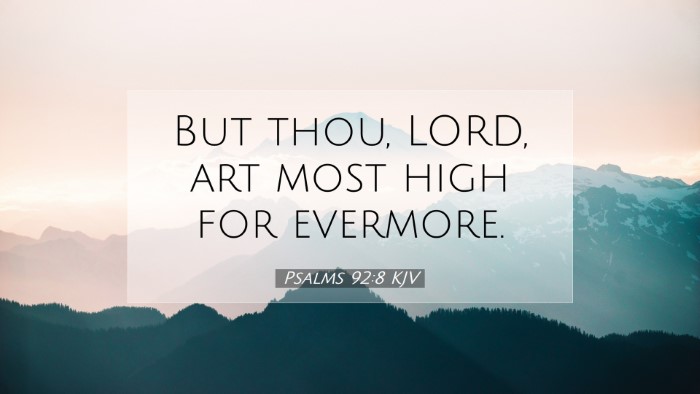Psalms 92:8 - A Commentary
Verse Text: "But thou, Lord, art most high for evermore."
Introduction
This verse from Psalm 92 serves as a profound proclamation of God's eternal supremacy. The psalmist asserts God's highest position, emphasizing His everlasting nature and authority over all created things. In this commentary, insights from respected public domain theologians will be explored to provide a comprehensive understanding of the significance of this verse.
Contextual Background
Psalms 92 is often noted for being a psalm of thanksgiving and praise, traditionally sung on the Sabbath. Its context highlights the faithfulness of God and the righteousness of those who dwell in His presence. Understanding the backdrop allows readers to grasp the full weight of the declaration made in verse 8.
Matthew Henry's Commentary
Matthew Henry emphasizes the contrast between God’s eternal nature and the fleeting nature of humanity. He notes that while the wicked may prosper for a time, their end is destruction, whereas the Lord reigns eternally:
- God’s Supremacy: "The most high God is ever above the reach of all earthly power and authority." Henry stresses that human institutions are transient, but God’s kingdom is everlasting.
- The Futility of Earthly Pride: "Though we see the wicked appearing to thrive, they are only temporary; God's reign will outlast them." This serves as a reminder for believers to place their hope not in worldly success, but in the divine sovereignty of God.
Albert Barnes' Notes
Albert Barnes elaborates on the significance of God's eternality. He writes:
- Enduring Nature of God: "The phrase ‘most high for evermore’ manifests God's position above all, unaffected by time." He echoes the sentiment that while kings and rulers rise and fall, God remains sovereign across all ages.
- Encouragement for the Believer: Barnes points out that the recognition of God’s eternal highness serves as a source of comfort and strength for believers who may feel overwhelmed by temporary tribulations.
Adam Clarke's Commentary
Adam Clarke provides a theological reflection on the nature of God as it relates to this verse. He states:
- A Call to Worship: "Understanding that God is most high calls for reverence and worship." Clarke stresses that acknowledging God’s authority leads believers to deeper acts of devotion.
- Ultimate Justice: "God's eternal nature reassures His justice; the transient injustices of life do not escape His notice." Clarke encourages readers that even in midst of moral dilemmas, they can trust in God's ultimate justice and oversight.
Theological Implications
The declaration of God as ‘most high’ holds several theological implications that are crucial for both spiritual formation and doctrinal understanding:
- The Trinity: God's position as eternal invites discussion regarding the nature of the Trinity, affirming that the Father, Son, and Holy Spirit share in this eternal sovereignty.
- Sovereignty and Providence: Understanding God’s eternal authority invites believers to submit their lives under His governance, trusting in His providential care throughout their struggles.
- Eschatology: The verse foreshadows the future reign of Christ, where He will establish His kingdom forever. Believers are thus encouraged to look forward to the fulfillment of God’s promises.
Application for Today’s Believers
Psalms 92:8 offers rich applications for contemporary believers:
- Assurance in Trials: In light of God’s eternal nature, believers can find peace and solace amidst life’s difficulties, knowing He remains in control.
- Call to Worship: Acknowledging God’s supreme authority compels believers to engage in heartfelt worship, both personally and corporately.
- Encouragement for Evangelism: The everlasting sovereignty of God provides a strong motivation for believers to share the gospel, highlighting the urgency of introducing others to the God who is most high.
Conclusion
The proclamation in Psalms 92:8 serves as a profound reminder of God's eternal sovereignty which transcends all earthly institutions and powers. Throughout history, as noted by Matthew Henry, Albert Barnes, and Adam Clarke, this verse invites reflection on God’s nature and offers profound comfort and encouragement. For pastors, students, and scholars alike, the understanding of God as the 'most high for evermore' becomes a pivotal cornerstone for both theology and personal faith journey.


